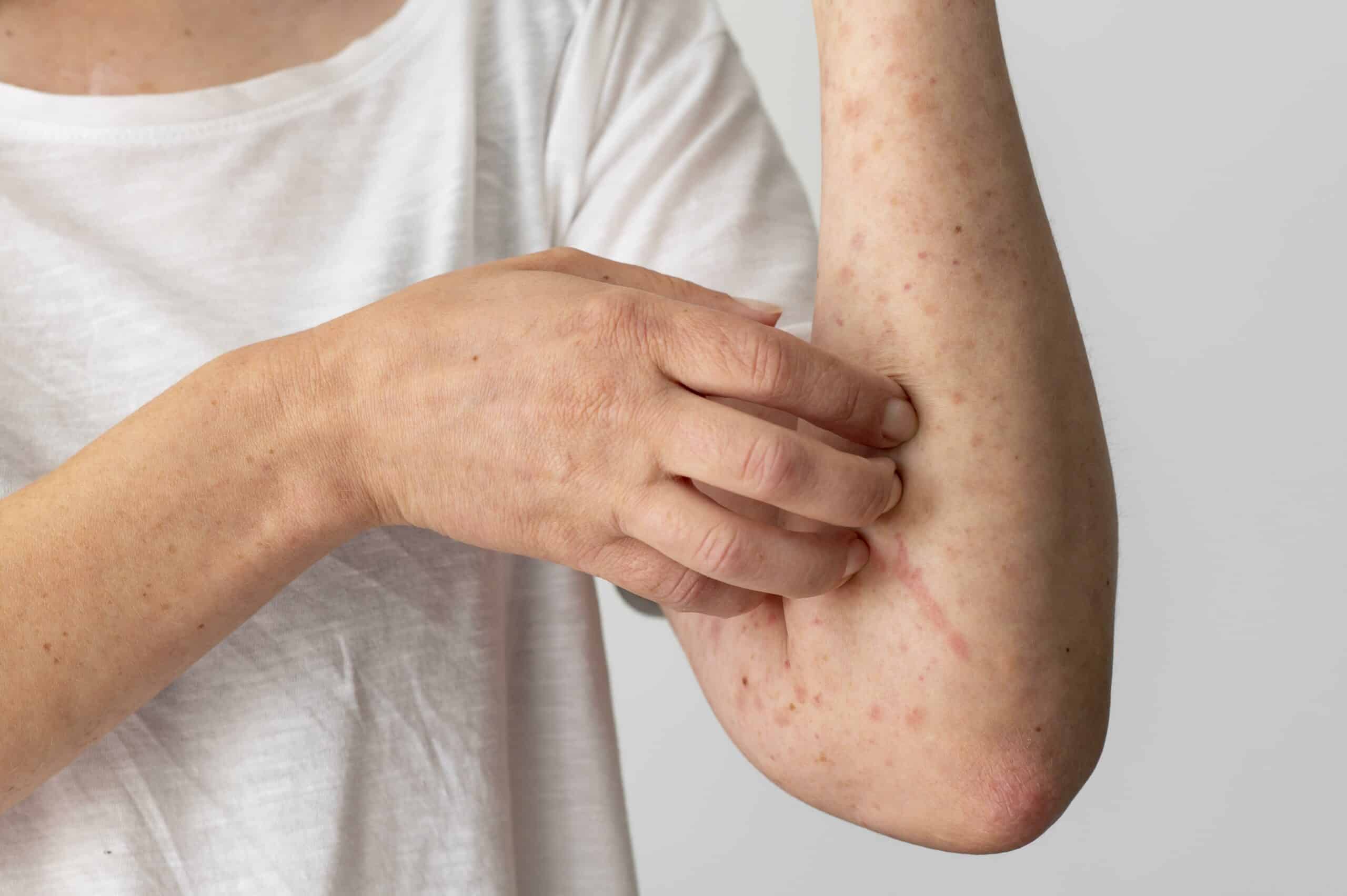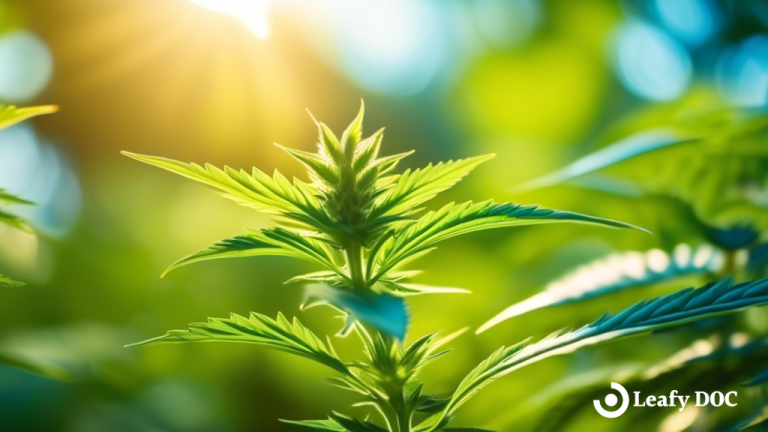Can You Be Allergic to Marijuana?
by Haley Mills · December 16, 2022
Can You Be Allergic to Marijuana? Many people are curious about whether or not they can be allergic to marijuana.

Can You Be Allergic to Weed? Many people are curious about whether or not they can be allergic to marijuana.
Around fifty million Americans experience allergic reactions to various substances annually, and about thirty-six million of those people also experience a reaction to smoked marijuana. The cannabis plant is a pollen-bearing plant that can produce allergens that trigger an allergic reaction in some people and animals.
It is unclear exactly how many people in the U.S. are allergic to cannabis. Still, as a growing number of states legalize marijuana use, there will surely be more research on the potential for allergic reactions from marijuana.
Recently, there seems to have been an increase in reports of CBD and THC allergies, possibly because it is becoming more popular as a treatment for various medical conditions. Some states have even legalized marijuana for recreational use.
This article explains the symptoms of cannabis allergies, which can differ depending on various factors. Read on to learn more about the causes, symptoms, and diagnosis of marijuana allergies.
What is a marijuana allergy?
It is possible to develop a cannabis allergy, and the most common allergic reaction comes from cannabis pollen, similar to hay fever. The pollen of cannabis plants can cause the immune system to attack foreign material, causing a severe allergic reaction.
A marijuana allergy is similar to other allergy triggers and can cause an adverse immune response when using cannabis products, especially when smoking. Though rare, there have also been a small number of anaphylaxis cases due to an allergic reaction from a marijuana plant.
Recently, there have been more reports of marijuana allergy; however, this is primarily due to the expansion of legalization across the United States.
Who Is at Higher Risk for Cannabis Allergies?
People with existing allergies, such as those triggered by cat dander, mold, dust mites, or pollen, may be more likely to develop a cannabis allergy. If your immune system is already reactive to environmental allergens, it might also overreact to cannabis exposure.
There are several ways you might come into contact with cannabis allergens, including inhaling pollen, smoking or vaping marijuana, handling cannabis products, or consuming edibles. The more frequently you’re exposed to cannabis, the higher your chances of developing a sensitivity or full allergic reaction.
Although more research is needed, early studies suggest a strong link between pre-existing allergic conditions and a heightened risk for cannabis-related allergic symptoms. As cannabis use becomes more widespread, it’s expected that awareness and research into these risks will grow as well.
Understanding the Difference Between CBD and THC
When diving into the world of cannabis compounds, two primary substances often come up: cannabidiol (CBD) and tetrahydrocannabinol (THC). Both are derived from the cannabis plant, but their effects and uses vary significantly.
CBD: The Non-Psychoactive Compound
- Forms and Uses: Available in oils, gummies, lotions, creams, and vaporizers, CBD is a versatile product. It’s commonly used for pain management and treating skin conditions.
- Effects: Unlike THC, CBD does not produce a “high.” It’s popular for its potential therapeutic benefits, including antipsychotic and anti-inflammatory effects.
THC: The Psychoactive Component
- Mind-Altering Effects: THC is the compound responsible for the mind-altering “high” that is often associated with cannabis use.
- Uses: Some consume THC for recreational purposes, while others use it for medicinal benefits like pain relief and appetite stimulation.
Key Differences
- Psychoactivity: THC alters perception and mood, while CBD does not.
- Usage: Both can be used for various health benefits, but their applications often differ due to their distinct effects on the brain.
In summary, while both CBD and THC originate from the same plant, their effects couldn’t be more different. CBD offers therapeutic benefits without the psychoactive impact, making it ideal for those who seek relief without a high. On the other hand, THC provides that classic cannabis high, appealing to both recreational users and those seeking specific medicinal benefits.
The most common symptoms of marijuana allergy are mild allergic reactions, but they can be severe in people with significant cannabis allergies. Many marijuana allergy symptoms occur right away in adults; however, onset can be delayed for several hours.
Marijuana Allergy Symptoms
The most common symptoms of marijuana allergy are mild allergic reactions, but they can be severe in people with significant cannabis allergies. Many marijuana allergy symptoms occur right away in adults; however, onset can be delayed for several hours.
While it is rare, it is possible to experience severe symptoms such as anaphylaxis after exposure to recreational or medical cannabis allergens. It’s essential to recognize your symptoms and seek medical attention immediately if you suspect an allergic reaction.
The most common signs of a Cannabis Sativa allergy are:
- Itchy, red, swollen, or runny eyes
- Dry cough or wheezing
- Sneezing and runny nose
- Sore throat
- Nasal congestion
- Nausea
- Low blood pressure
- Respiratory Symptoms
- Anaphylaxis (extreme allergy)
Cannabis Allergy Causes
The body’s immune system is to blame for all allergies, including a cannabis allergy. Our immune system is responsible for protecting the body from harmful germs, so it defends itself by releasing proteins called antibodies when it detects something dangerous. Antibodies’ job is to release chemicals that trigger symptoms like sneezing, coughing, and fever, which are intended to assist in clearing it from the system. When the immune system overreacts to certain substances, this will trigger an allergic reaction.
It’s vital to remember that if you have specific allergies, you may have an allergic reaction to weed. Marijuana use has also been associated with developing allergies to cat dander, dust mites, mold, and other plants.
Understanding Anaphylaxis and How to Respond
What is Anaphylaxis?
Anaphylaxis is a critical allergic reaction that can pose a serious threat to life. This intense response by the immune system typically occurs within minutes of exposure to an allergen, such as food, medication, or insect stings. Recognizing the signs is crucial for immediate action.
Signs and Symptoms
Symptoms of anaphylaxis can arise swiftly and may include:
- Skin reactions like hives or redness
- Swelling in areas such as the face or mouth
- Breathing difficulties, including wheezing
- An increased or irregular heartbeat
- Skin that feels cold or clammy
- A sense of anxiety or feeling disoriented
- Lightheadedness or dizziness
- Nausea or vomiting
- Changes in lip color, turning blue or pale
- Fainting spells or lost consciousness
Immediate Actions to Take
- Locate and Use an Epinephrine Auto-Injector: If available, administer an epinephrine injection immediately. Follow the device’s instructions for proper use.
- Call Emergency Services: Dial 911 (or local emergency number) to get professional help quickly.
- Position the Individual Safely: Have the person lie down flat. Turn them on their side if vomiting occurs to prevent choking.
- Remain with the Person: Stay close until help arrives and closely monitor their condition.
Additional Epinephrine Doses
In some cases, a second dose of epinephrine may be needed. If symptoms persist or recur within 5 to 15 minutes, administer another injection if a second device is on hand.
Being prepared and acting quickly can make a significant difference in the outcome of an anaphylactic episode. Always ensure that those at risk carry their epinephrine auto-injectors and understand how to use them.
Is Indica or Sativa worse for allergies?
The cannabis plant has two major types: Cannabis sativa and Cannabis indica. While these two kinds of plants are both members of the cannabis family, they differ in appearance and chemical composition.
The indica and sativa plants tend to produce very high amounts of cannabinoids like THC and CBD, which is one of the reasons they are so widely cultivated. Both indica and sativa plants are parents to many hybrids that have their own unique properties.
Cannabis Sativa is said to trigger marijuana allergies significantly more than Indica. This could be due to the type and amount of pollen and the origin locations of each cannabis plant.
Potential Health Risks
A marijuana allergy can cross-react with other specific foods allergens. Anaphylaxis and cross-reactivity are listed as two of the primary associated risks linked to a marijuana allergy. Cross-reactivity happens when the plant’s pollen proteins mimic another plant’s proteins and can cause an allergic reaction when the body comes in contact with similar proteins.
Foods that can resemble marijuana proteins include:
- almonds
- apples
- bananas
- chestnuts
- eggplant
- grapefruit
- peaches
- tomatoes
Types of Allergy Reactions
Marijuana allergy symptoms may include many clinical aspects depending on how, when, and where a patient was exposed. Contact with or touching a cannabis plant can cause someone allergic to break out in hives and rashes or experience significant swelling in the body, called angioedema.
Inhaling weed allergens can result in moderate nasal or eye allergy symptoms, including respiratory symptoms, runny nose, sneezing, itching, swelling, and watery eyes. More severe symptoms include asthma (wheezing and shortness of breath) and Anaphylactic shock, especially when eating hemp seeds.
In addition, cross-reactivity with certain foods can potentially cause severe allergic reactions. The critical and relevant allergens and their reactions still need to be further researched and defined.
What Are the Potential Risks of Cannabis Edibles?
Cannabis edibles offer a smoke-free, discreet way to consume marijuana, but they come with unique risks that users should understand. Unlike inhaled forms, edibles take longer to take effect, often leading to accidental overconsumption and intense, prolonged symptoms.
Common risks associated with edibles include:
- Delayed Onset: Edibles can take up to two hours to kick in. This delay may lead users to consume more than intended while waiting for effects to appear.
- Overconsumption: Because of the slow onset, taking too much is a frequent mistake, potentially leading to symptoms like anxiety, paranoia, or even hallucinations.
- Unpredictable Potency: THC and CBD levels in edibles can vary widely, making accurate dosing difficult without proper labeling or experience.
- Long-Lasting Effects: Edibles are digested and metabolized through the liver, resulting in stronger, longer-lasting effects that may persist for 6 hours or more.
- Accidental Ingestion: Products resembling regular snacks or candy can easily be mistaken by children or pets, posing serious health risks.
- Digestive Side Effects: Some users experience nausea, stomach pain, or vomiting, especially at higher doses or with certain ingredients.
To minimize risks, always start with a low dose, check the label for potency, and wait before taking more. Those with allergies or sensitivities should exercise additional caution.
What Reactions Can Occur with CBD Use?
CBD, derived from the cannabis plant, is increasingly popular in various forms like oils, gummies, lotions, and vaporizers. Though many turn to CBD for benefits like pain relief or treating skin conditions, it’s crucial to understand the potential reactions it may provoke.
Potential Side Effects
While pure CBD doesn’t have the psychoactive effects attributed to THC (tetrahydrocannabinol), it’s not without its side effects. Some individuals might experience discomfort or adverse reactions, including:
- Drowsiness: CBD can cause a feeling of lethargy for some users.
- Digestive Issues: Changes in appetite or diarrhea are commonly reported.
- Liver Concerns: In certain cases, CBD may contribute to liver damage, particularly when consumed in high doses over a prolonged period.
Allergic Reactions
Not everyone tolerates CBD well. Allergic reactions can be triggered, not necessarily by CBD itself, but by compounds within it:
- Terpenes: Natural compounds like linalool and D-limonene, present in CBD products, can cause allergies in sensitive individuals. Symptoms might include skin rashes, itching, or even more severe respiratory issues.
Research has identified hydroperoxides of linalool and D-limonene, oxidized forms commonly found in scented products and some topical CBD items, as triggers for contact allergies. These reactions can appear as dermatitis or other skin issues, particularly with prolonged or direct skin exposure. If you have a known sensitivity to fragrances or essential oils, check product labels carefully or consult a healthcare provider before use.
Drug Interactions
CBD can also interact with various medications. If you’re taking prescription drugs, particularly those processed by the liver, such as blood thinners or seizure medications, consult with a healthcare professional. CBD might alter the way these medications work in your body, potentially leading to complications.
While many find CBD beneficial, it’s important to be mindful of its possible reactions. Always start with a low dose and monitor your body’s response. When in doubt, particularly if you have pre-existing conditions or take medication regularly, seek guidance from a healthcare provider.
How to Limit Exposure While Working in a Cannabis Processing Plant
Working in a cannabis processing plant comes with the unique challenge of limiting exposure to potential allergens or irritants. Here are some effective strategies workers can adopt:
- Protective Gear is Essential: Always wear appropriate protective equipment. This includes:
- Face Masks: Select masks that effectively filter out particles and allergens.
- Gloves: Use high-quality gloves to protect your skin from direct contact with plant materials.
- Medications and Aids:
- Allergy Medications: Consider taking over-the-counter allergy medications to help manage symptoms. Consult with a healthcare provider for the best option.
- Inhalers: For individuals with respiratory sensitivities, keeping an inhaler handy can be crucial.
- Hygiene Practices:
- Regularly wash hands and change clothing after handling cannabis materials to minimize skin contact.
By incorporating these protective measures, workers can significantly reduce their risk of exposure and maintain their health while working in this environment.
How to Diagnose A Weed Allergy
Because medical or recreational marijuana is not legal in many U.S. States, it can be challenging for a doctor to diagnose a marijuana allergy clinically. In legal states, it is possible to complete provocation testing involving exposure to the plant and treating symptoms in the physician’s office.
In these scenarios, several types of skin tests can be used:
- Skin Prick Test: This minimally invasive test involves applying a diluted allergen, such as cannabis, to the skin’s surface with a needle. If a red bump, itching, or redness develops within 15 minutes, it may indicate an allergy.
- Intradermal Test: A more in-depth approach involves injecting a diluted allergen just below the skin’s surface with a thin needle to observe for any allergic reaction.
An allergist can also topically apply a small amount to the skin to observe for an allergic reaction. With the increased use of marijuana as medicine, many are hopeful that more testing will be available in the future.
How Blood Tests Diagnose Cannabis Allergies
Blood tests are a key tool in diagnosing cannabis allergies, offering a comprehensive look at how your body reacts to the substance. To determine if you have an allergy, healthcare professionals will analyze your blood for specific antibodies related to cannabis exposure. Here’s how the process works:
- Blood Sample Collection: A medical professional takes a small blood sample, typically with a single needle prick. This sample is then sent to a lab for analysis.
- Antibody Analysis: In the lab, the sample is tested for antibodies—proteins your immune system produces in response to allergens. If the levels of these antibodies exceed normal expectations, it may indicate an allergic reaction to cannabis.
- Advantages Over Skin Tests: Blood tests can be more suitable for some individuals, especially if skin tests aren’t ideal due to interference from medications. They offer the convenience of a single needle usage and are less invasive in terms of preparation.
- Considerations: While blood tests are generally easier on the patient in terms of procedure, they do have drawbacks. Results may take longer to be delivered, and they often come at a higher cost compared to traditional skin tests.
By understanding both the process and the advantages, you can make an informed decision about diagnosing cannabis allergies through blood tests.
What is Cannabinoid Hyperemesis Syndrome (CHS)?
Regular cannabis users can experience a disorder known as Cannabinoid Hyperemesis Syndrome. CHS is a medical condition that can cause repeated and severe bouts of vomiting when using marijuana. It is infrequent, but we encourage caution when using weed on a long-term scale.
Cannabinoid Hyperemesis Syndrome symptoms typically occur in the prodromal phase, the hyperemesis phase, and the recovery phase.
During the prodromal phase, patients can experience nausea and abdominal pain lasting for several months.
During the hyperemesis phase, more severe symptoms may occur, such as:
- Recurring nausea or vomiting
- Stomach pain
- Decreased food intake
- Significant weight loss
- Signs of dehydration
During the recovery phase, Cannabis Hyperemesis Syndrome symptoms will usually ease or go away completely on their own; however, they may come back if you begin using marijuana again.
Treatment Options for Marijuana Allergy
There is currently no marijuana allergy treatment for cannabis users specifically, but you can take antihistamines to manage and reduce symptoms. For many types of pollen allergy, allergy shots are prescribed to reduce sensitization, but they are not currently available for marijuana pollen. Since there aren’t many treatment options, those with allergies should avoid marijuana plants and the drug to prevent the onset of symptoms.
Avoiding exposure to cannabis is the only sure way to prevent an allergic reaction. If you’re using medical cannabis and suspect an allergy, consult your doctor to explore alternative treatments or consumption methods. Additionally, those with a severe allergy should carry an epinephrine injection to combat accidental exposure and potential anaphylaxis.
For individuals working in cannabis processing environments, minimizing exposure is crucial. Consider these protective measures:
- Allergy Medications: Regularly take prescribed allergy medications to manage potential symptoms.
- Face Masks: Use masks to reduce inhalation of cannabis particles.
- Gloves: Wear gloves to avoid direct skin contact with the plant.
- Inhalers: Keep an inhaler handy if you have a history of respiratory reactions.
By incorporating these strategies, you can better manage and potentially prevent cannabis allergy symptoms effectively.
Is it safe for people with Asthma to use cannabis?
Many people with asthma smoke or vape cannabis, which could harm the lungs and airways, especially in younger people. In a recent PEACE survey, around 53 percent of cannabis users with asthma smoked, while approximately 35 percent vaped. About half of the reported cannabis smokers with asthma had uncontrolled asthma symptoms.
It isn’t recommended that people with asthma smoke or vape cannabis because it can increase cough, wheezing, shortness of breath, and even an asthma attack or flare-up. However, there may be potential therapeutic benefits for asthma using other consumption methods such as edibles, tinctures, and topicals.
These routes of administration may be safer since they don’t harm the lungs the way inhaled consumption does. Asthma patients who are exposed to secondhand cannabis smoke could suffer from an allergic reaction as well.
What Should Consumers Consider When Using CBD Oil or Products?
When venturing into the world of CBD oil or other CBD products, it’s important to approach with care and thoughtful consideration. Here’s a comprehensive guide to help you make informed decisions:
1. Start with Small Doses:
Begin your CBD journey by using a minimal amount. This helps you monitor how your body reacts and ensures you don’t experience any adverse effects.
2. Quality and Source:
Choose products from reputable brands that provide transparency about their sourcing and extraction processes. Look for third-party lab testing results to verify product purity and potency.
3. Product Type and Form:
CBD is available in various forms—oils, capsules, edibles, topicals, and more. Consider why you’re using CBD to determine which form best suits your needs.
4. Consult a Healthcare Professional:
Before starting any new supplement regimen, especially if you have existing health conditions or are on medication, consult with a healthcare provider to ensure CBD is safe for you.
5. Check Local Regulations:
CBD laws vary widely. Make sure you are aware of the legal status of CBD products in your area to avoid any legal issues.
6. Monitor for Reactions:
Once you start using CBD, watch for any unusual symptoms. Keeping a journal of your dosage, timing, and effects can help you and your doctor assess its impact.
7. Understand Possible Drug Interactions:
Some medications may interact with CBD, altering their effectiveness. Discuss potential interactions with your pharmacist or doctor.
Engaging with CBD oil thoughtfully and responsibly will help you maximize its benefits while minimizing potential risks. Always prioritize safety and credibility when exploring new wellness products.
Final Thoughts
Most patients with marijuana allergy symptoms have a mild to moderate reaction similar to seasonal allergies or mild allergic skin reactions. When people often avoid the plant and its pollen, the symptoms resolve relatively quickly. Those severely allergic to marijuana should seek medical treatment and carry allergy medications in case of accidental exposure.
Last Updated: June 12, 2025
Get Approved for Your Medical Marijuana Card in Minutes!

Get Your Medical Card
Connect with a licensed physician online in minutes

Like This Article?
Share with your friends
Table of Contents
Keep Reading
-
Understanding The Application Fees For A Medical Marijuana Card
Learn about the costs of medical marijuana card application fees and discover how to save money. Don’t miss out on the relief you need – click here to find out more!
-
The Ultimate Outdoor Growing Guide For Cannabis
Ready to cultivate the best buds ever? Check out our ultimate outdoor growing guide for cannabis. Expert tips, tricks, and advice await you – start growing today!
-
Using Cannabis For Managing Pain In The Elderly
Learn how cannabis can be a safe and effective solution for managing pain in the elderly. Explore the benefits and risks of using cannabis for pain relief today!



